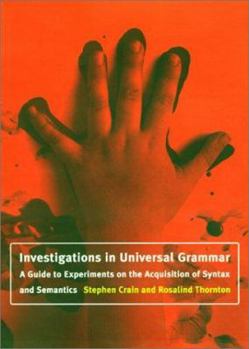Investigations in Universal Grammar: A Guide to Experiments on the Acquisition of Syntax and Semantics
(Part of the Language, Speech, and Communication Series)
Select Format
Select Condition 
Book Overview
This introductory guide to language acquisition research is presented within the framework of Universal Grammar, a theory of the human faculty for language. The authors focus on two experimental techniques for assessing children's linguistic competence: the Elicited Production task, a production task, and the Truth Value Judgment task, a comprehension task. Their methodologies are designed to overcome the numerous obstacles to empirical investigation of children's language competence. They produce research results that are more reproducible and less likely to be dismissed as an artifact of improper experimental procedure.
In the first section of the book, the authors examine the fundamental assumptions that guide research in this area; they present both a theory of linguistic competence and a model of language processing. In the following two sections, they discuss in detail their two experimental techniques.
Related Subjects
Language Arts




